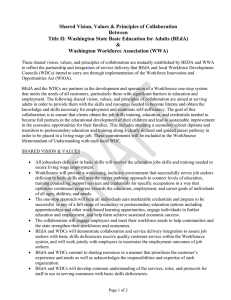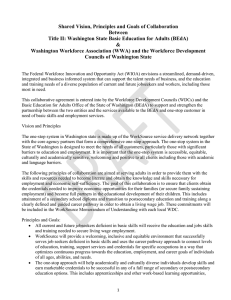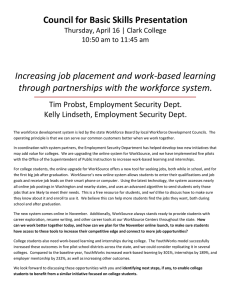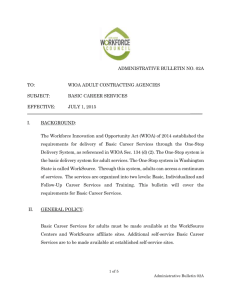Shared Vision, Principles and Goals of Collaboration Between
advertisement
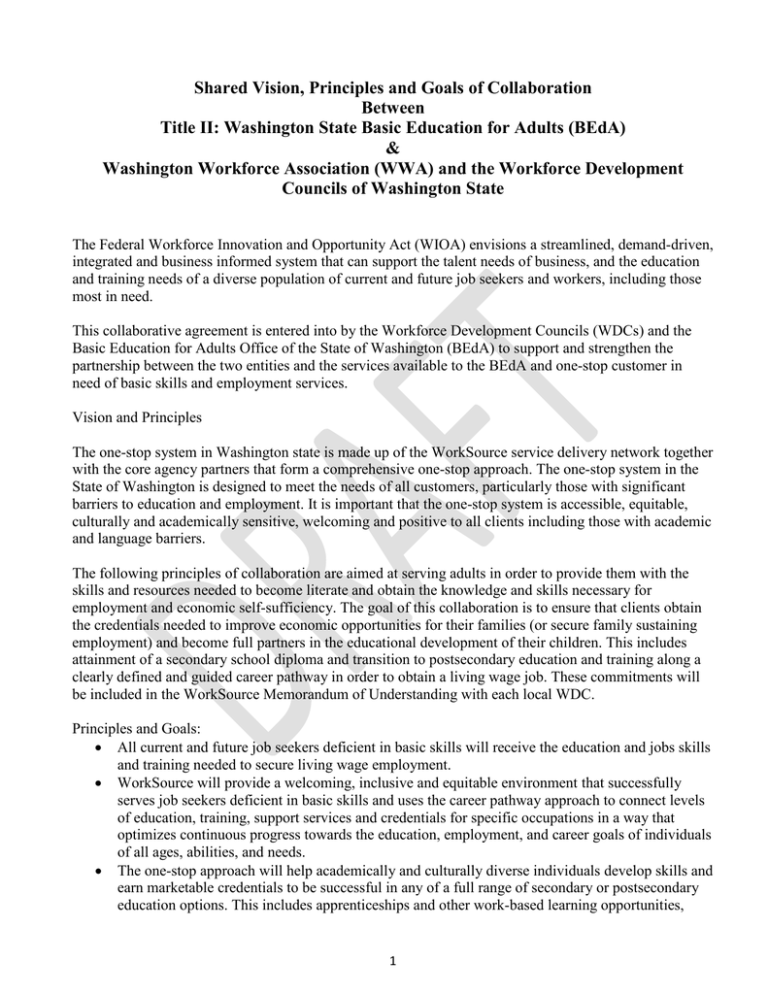
Shared Vision, Principles and Goals of Collaboration Between Title II: Washington State Basic Education for Adults (BEdA) & Washington Workforce Association (WWA) and the Workforce Development Councils of Washington State The Federal Workforce Innovation and Opportunity Act (WIOA) envisions a streamlined, demand-driven, integrated and business informed system that can support the talent needs of business, and the education and training needs of a diverse population of current and future job seekers and workers, including those most in need. This collaborative agreement is entered into by the Workforce Development Councils (WDCs) and the Basic Education for Adults Office of the State of Washington (BEdA) to support and strengthen the partnership between the two entities and the services available to the BEdA and one-stop customer in need of basic skills and employment services. Vision and Principles The one-stop system in Washington state is made up of the WorkSource service delivery network together with the core agency partners that form a comprehensive one-stop approach. The one-stop system in the State of Washington is designed to meet the needs of all customers, particularly those with significant barriers to education and employment. It is important that the one-stop system is accessible, equitable, culturally and academically sensitive, welcoming and positive to all clients including those with academic and language barriers. The following principles of collaboration are aimed at serving adults in order to provide them with the skills and resources needed to become literate and obtain the knowledge and skills necessary for employment and economic self-sufficiency. The goal of this collaboration is to ensure that clients obtain the credentials needed to improve economic opportunities for their families (or secure family sustaining employment) and become full partners in the educational development of their children. This includes attainment of a secondary school diploma and transition to postsecondary education and training along a clearly defined and guided career pathway in order to obtain a living wage job. These commitments will be included in the WorkSource Memorandum of Understanding with each local WDC. Principles and Goals: • All current and future job seekers deficient in basic skills will receive the education and jobs skills and training needed to secure living wage employment. • WorkSource will provide a welcoming, inclusive and equitable environment that successfully serves job seekers deficient in basic skills and uses the career pathway approach to connect levels of education, training, support services and credentials for specific occupations in a way that optimizes continuous progress towards the education, employment, and career goals of individuals of all ages, abilities, and needs. • The one-stop approach will help academically and culturally diverse individuals develop skills and earn marketable credentials to be successful in any of a full range of secondary or postsecondary education options. This includes apprenticeships and other work-based learning opportunities, 1 • • • • • • • • • further education and employment, and continued support if needed to achieve sustained economic success. BEdA and WDCs will create and utilize a range of local and State resources and partnerships to inform and support shared customers/current and future job seekers. Navigation, guidance and advising services will be provided to clients beginning with where they are when they enter the one-stop system to the point where they obtain a self-sufficient job. Training and placement needs of clients are identified and client referral to job placement services and all job appropriate resources are made by providing initial and more in depth assessment of needs, goals, skills and barriers to education and employability. Career pathways, labor market information, and employability skills are provided so customers can establish a clear path to self-sufficient employment; Employer based training opportunities will be provided for those who will benefit from such training. Job placement services will be provided to all current and future job seekers to assist them in obtaining or accessing job opportunities that match their skills with employer needs. BEdA and WDCs will demonstrate collaboration and service delivery integration to assure current and future job seekers with basic skills deficiencies receive quality customer service within the WorkSource system, and will work jointly with employers to maximize the employment outcomes of job seekers. BEdA and WDCs commit to sharing resources in a manner that prioritizes the customer’s experience and needs as well as acknowledges the capacity, responsibilities and expertise of each organization. BEdA and WDCs will develop common understanding of the services and roles of one-stop partners, as well as protocols for staff to use in serving customers with basic skills deficiencies including data sharing agreements. What BEdA Will Do • • • • • • • • • • • • Support the development of statewide data sharing agreements. Participate in a locally driven, fully integrated WorkSource service delivery system. Provide basic skills services and training to WorkSource customers. Collaborate with WDCs and one-stop partners to develop and identify resources for navigation services. Provide staff training, technical assistance and consultation to WorkSource partners on service delivery to individuals with basic skills needs. Participate in annual reviews of WorkSource services and resources. Negotiate any occupancy costs (e.g., office space, equipment, utilities, etc.) if BEdA staff are colocated at WorkSource locations. Support integrated staff and coordinated services whenever and wherever possible that move clients to living wage jobs. Contribute to the success of the one-stop system by participating in the orientation, referral and joint service delivery to individuals with educational needs. Participate in the development and implementation of the local WorkSource Business Plan and delivery of employer services aimed at the employment of job seekers with basic skills deficiencies. Contribute to the infrastructure of the WorkSource system costs financially or with in-kind support in proportion to the relative benefits received by BEdA customers and consistent with federal regulations under Title II. 2 • • Refer and coordinate services for BEdA clients who are eligible and for whom funds are available so they receive the Title I and Title II WorkSource and training services they need in order to achieve their employment goals which are based on the local Memorandum of Understanding and local WorkSource protocols. Provide educational testing and placement services in collaboration with the WDCs to BEdA clients. What WDCs Will Do • • • • • • • • • Support the development of statewide data sharing agreements. Assure that the WorkSource system provides fully accessible and integrated service delivery to current and future job seekers with basic skills deficiencies. Work with BEdA staff to implement successful orientation, referral and joint service delivery methods that assist job seekers with basic skills deficiencies in receiving seamless services within the WorkSource system. Lead the development and the implementation of the local WorkSource Business Plan and establish the strategic direction to serve employers who seek to employ BEdA clients. Lead and convene WorkSource partners to advocate for the needs of customers, particularly individuals who experience employment and education and training barriers. Collaborate with BEDA and one-stop partners to identify navigation resources and develop effective navigation systems. Determine availability of WIOA Title I and II funds for BEdA customers who are eligible for services. Convene and lead partnership development, local one-stop system training, communication and information sharing. Participate in annual reviews of WorkSource services and resources. _________________________________________ Jon M. Kerr Date BEdA Director _________________________________________ Jeanne Bennett Date WWA President 3
